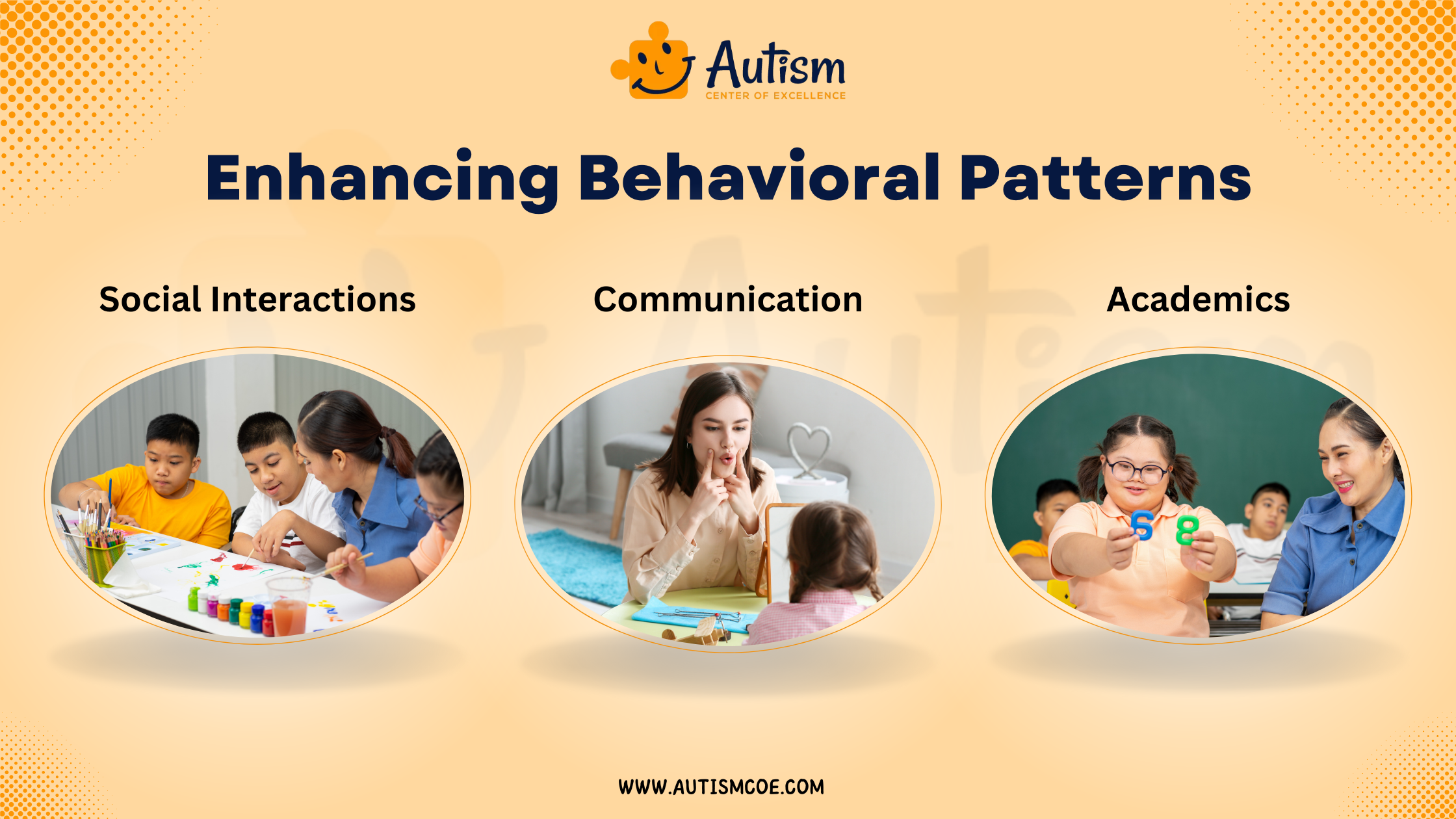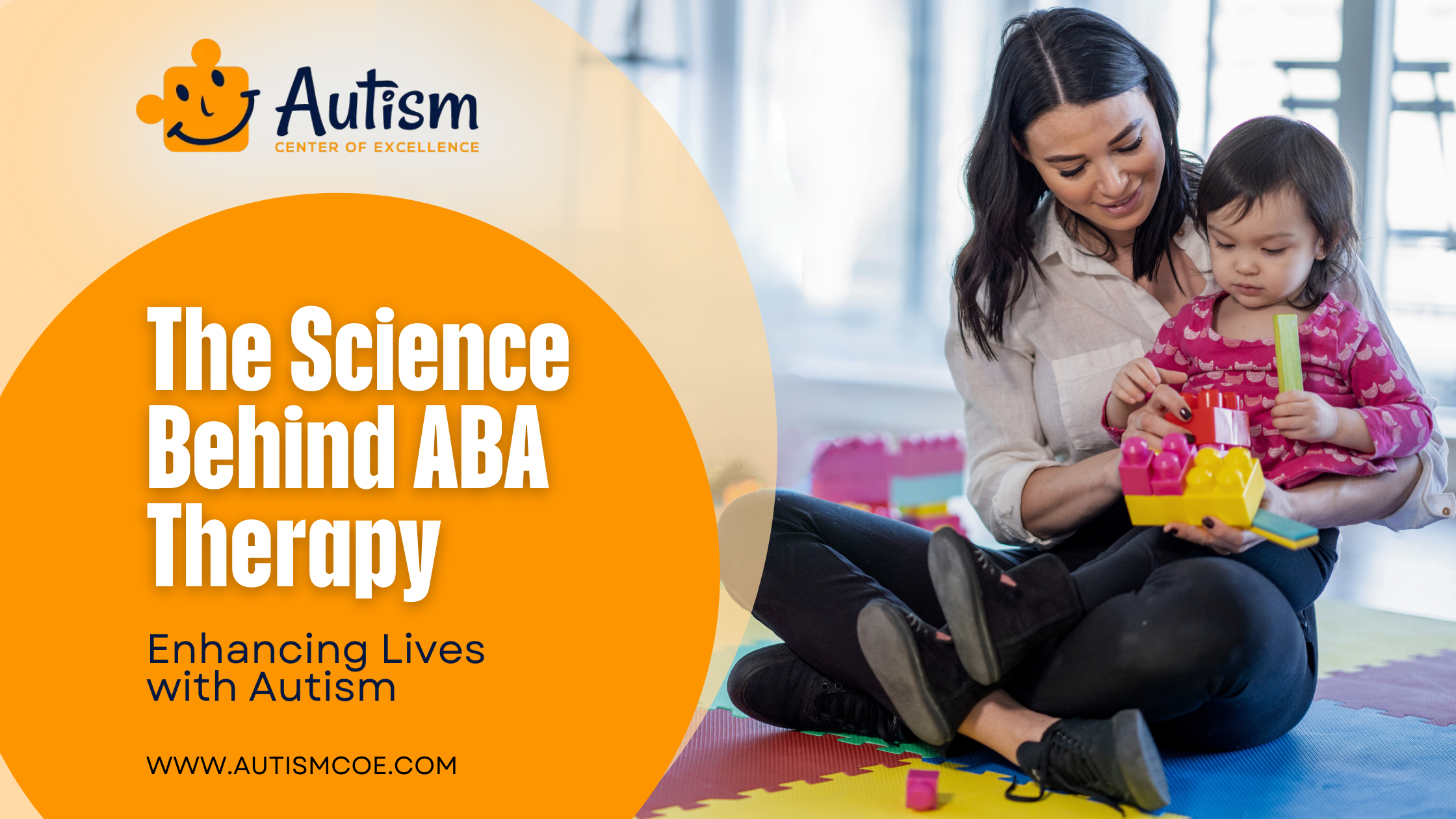As per the CDC, ASD has been estimated to affect around one in every 44 children in the United States of America. It is shocking that such a high percentage of children may be diagnosed with autism. This high percentage makes the need for early identification and effective treatments more pressing. Among these treatments, a specific strategy has received much attention and effectiveness: the Applied Behavior Analysis (ABA) therapy.
ABA is a notably innovative, evidence-based, and comprehensive method, which systematically applies principles of behavioral analysis to increase quality of life and teach new desirable behaviors to persons with autism. ABA therapy rewards the right behaviors and skills and minimizes the undesired ones so that people can learn how to overcome various challenges in their daily lives.
Understanding and Improving Specific Behaviors
ABA therapy is based on the theoretical foundation of behavior analysis. It’s a structured approach to analyzing the causes of specific behaviors and then proceeding to optimize those behaviors. For children with autism, this often means working on key areas such as:

Social Interactions:
Social Interactions is one of the biggest challenges that many children with autism face, particularly when it comes to understanding social signals. Skills developed by the ABA therapist include eye contact, sharing, turn taking, and managing appropriate social interactions. These skills are invaluable when relating to other individuals and dealing with colleagues.
Communication:
ABA therapy stands out in promoting generalization of skills in communication. For non-verbally delayed children, this could include augmentative and alternative communication strategies like picture exchange systems or sign language. For verbal children, therapy sessions could include improving the child’s capacity for expressing needs verbally or the ability to converse and use proper language when in certain settings.
Academics:
Children require language development skills, which play an important role in school readiness and day-to-day academic performance. Through ABA therapy, teachers and parents create a customized plan for each child with autism, helping them learn counting, reading, and solving math problems. This therapy breaks down big tasks into smaller ones. In doing so, children tackle a manageable step of their long-term goal with each session.
Enjoying Reading?
Join Our Weekly Newsletters!
Subscribe now to stay updated with our latest email updates.
Utilizing Reinforcement to Shape Behavior
This involves rewards for practices that the child should repeat in future. For instance, if a child exhibits a wanted behavior, it will be followed by reinforcement in the form of compliments, a toy, candy, or another item. In the long run such reinforcements assist the child and enforce the ideal behaviors that benefit them as they grow.
Breaking Down Complex Behavioral Tasks
Using Applied Behavior Analysis or ABA therapy is the creation of chains of instructions in which large tasks are divided into small steps. For example, learning to tie shoelaces is best taught as many sub-tasks as possible since doing it in one go can cause frustration. But when it is divided into simple stages – such as holding the laces, crossing them over, making loops, and pulling tight – therapists can explain it to patients. Every small achievement completed gives assurance and experience to accomplish the whole task.
Equipping Children with Behavioral Skills for Independence
ABA therapy aims to foster skills that enable children to manage the environment on their own and improve their performance in day-to-day activities. This stems from the understanding that daily living skills help children with autism interact with their environment, peers, teachers, families, and friends, ultimately improving their quality of life.
How does ABA Therapy Help with Skill Development in Autism
ABA therapy is useful and important when helping children by providing them with the required skills for their development. ABA therapy involves structured and specific targeted interventions personalized to support the core domains essential for development and lifelong functioning of the child. Here’s a closer look at how ABA therapy supports skill development in various domains:
Communication Skills
Perhaps one of the most difficult facets of learning for a child with autism is communication. ABA therapy addresses this by:
Enhancing Verbal Abilities:
For those children who are verbal, ABA therapy helps in going a notch higher in the use of words, grammar and teaching them on how to engage in conversation appropriately. Examples of such strategies are modeling and prompting children to use language more properly.
Alternative Communication Methods:
With children who have little speech, ABA therapists use methods such as Picture Exchange Communication Systems (PECS) or sign language. These methods equip the children with ways through which they can communicate their needs and ideas. Allowing them to communicate better with those around them.
Soical Skill
Interacting with other kids and peers is sometimes very difficult for children with autism. ABA therapy focuses on:
Building Social Interactions:
Some of the skills that the therapists foster in the child include greetings, sharing responsibilities, taking turns, and nonverbal communication.
Structured Play and Group Activities:
Children must learn how to play and interact in groups via role playing and other group assignments in structured environments. Mirroring and social stories can also be employed to help the child learn the appropriate responses and actions for different social contexts.
Academic Skills
Academic success is another area where ABA therapy can make a significant difference:
Foundational Skills:
Additional ABA therapies focus on improving academic performance in areas including mathematics, reading, and writing. All these skills are vital, especially for school readiness.
Problem-Solving and Critical Thinking:
Another domains addressed is higher-order pointers, which encompass problem-solving and critical thinking processes. Applied behavior analysis is used to divide activities into smaller manageable tasks and cheer at every phase.
Daily Living Skills
Independence in daily living activities is a key goal of ABA therapy:
Self-Care Skills:
Therapists help children who need to build the skills to dress and groom themselves and learn how to manage toileting issues. These skills are taught in easily approachable many pashes that children can grasp and apply in sequence without much difficulty.
Household Tasks:
Table manners, cleaning, and cooking skills are also detailed, to enable children to gain independence in their daily activities.

Benefits of ABA Therapy
Behavior Improvement
The behaviors which are not required like aggression, temper tantrums or sulking are eliminated, but useful behaviors such as use of verbal communication or participation in constructive activities are promoted.
Individualized Approach
For every child, there is an individual education plan made for him/her by a team of highly specialized therapists.
Evidence-Based
ABA has been applied for years now, and scientific findings have shown that this form of intervention is the most effective.
Skill Development
The important thing to note is that ABA is useful in enabling the development of skills in children concerning aspects such as dealing with people and/or personal needs.
Parental Involvement
During the implementation process the parents are also engaged in allowing the proposed strategies to be effectively implemented in all the settings.
Frequently Asked Questions & Answer
Does ABA Therapist Require Medication while Performing Therapy?
No, ABA therapists do not need any kind of medication while doing therapy. ABA therapy is a single approach to behavior development which creates a strategy to modify behavior and learn new skills. It does not require the use of drugs as does the medical model. But if a child has other medical conditions that require him to take some drugs, the ABA therapist may attend to that child in form of liaising with other medical personnel.
How Long Does it Take for ABA Therapy to Help a Child with Autism?
The time required for therapy depends on several factors of improvement, such as the child’s characteristics, the severity of symptoms, frequency of therapy, and parents or caregivers. The rate of improvement varies among children, some may make improvements in a few months while others may spend several years in therapy to achieve their desired goals. ABA therapy is very structured, and behavior is always assessed and changed over time to facilitate the best results for the child.
What is the Difference Between ABA Therapy and Other Behavioral Therapies?
ABA Therapy distinguishes itself by employing systematic, data-driven approaches of behavior assessment and modification. It is highly structured and focused on measurable outcomes, as opposed to alternative behavioral therapies that may be more holistic or less structured.ABA Therapy distinguishes itself by employing systematic, data-driven approaches of behavior assessment and modification. It is highly structured and focused on measurable outcomes, as opposed to alternative behavioral therapies that may be more holistic or less structured.
How can I find a reputable ABA Therapy provider?
Look for certified professionals (BCBAs or BCaBAs), ask healthcare practitioners or support organizations for references, and confirm the therapist’s experience and track record with similar situations in order to choose a reliable ABA therapy provider.
Conclusion
Therefore, ABA therapy is an essential service for a child with autism as it focuses on communication, social interaction, school, and adaptive learning skills. The method and evidence-based procedures improve the children’s independence and their families’ well-being. Overall, ABA therapy focuses on providing practices that enable children to develop crucial aspects of life to help them succeed.
Thus, engagement of the parents in ABA therapy for the child’s treatment is highly recommended for enhanced performance. According to the best of our knowledge, effective response include spectrum of parent education, working with therapists and rehearsing the skills at home making parents the active members of child’s change. This joint approach ensures initial development of the child, enhancing confidence of the parent in fostering the child and improving the relationship between the parent and the child. Therefore, parents involved in the ABA therapy process provide children with autism with the tools and environment to grow up to be the best they can be.
Please Note: The content of this blog is for informational purposes only and should not be considered a substitute for professional medical advice, diagnosis, or treatment. Consult a qualified healthcare professional for personalized guidance tailored to your specific situation.

Bhavika Bhasin
Bhavika Bhasin is the Research and Marketing officer at AutismCOE. She works with children and adults with ASD. Her clinical research includes evaluating various available autism screening and diagnosis methods and their efficacy. She is currently developing a novel screening exam that is indicated to be more accurate than the existing available exams. She is also writes articles papers for various publications.


